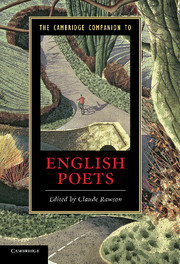Book contents
- Frontmatter
- Introduction
- 1 Geoffrey Chaucer
- 2 Thomas Wyatt
- 3 Edmund Spenser
- 4 William Shakespeare
- 5 John Donne
- 6 Ben Jonson
- 7 George Herbert
- 8 John Milton
- 9 Andrew Marvell
- 10 John Dryden
- 11 Jonathan Swift
- 12 Alexander Pope
- 13 William Blake
- 14 Robert Burns
- 15 William Wordsworth
- 16 Samuel Taylor Coleridge
- 17 George Gordon, Lord Byron
- 18 Percy Bysshe Shelley
- 19 John Keats
- 20 Alfred Lord Tennyson
- 21 Robert Browning
- 22 Emily Brontë
- 23 Christina Rossetti
- 24 Thomas Hardy
- 25 William Butler Yeats
- 26 D. H. Lawrence
- 27 T. S. Eliot
- 28 W. H. Auden
- 29 Philip Larkin
- Further Reading
- Index
19 - John Keats
Published online by Cambridge University Press: 28 May 2011
- Frontmatter
- Introduction
- 1 Geoffrey Chaucer
- 2 Thomas Wyatt
- 3 Edmund Spenser
- 4 William Shakespeare
- 5 John Donne
- 6 Ben Jonson
- 7 George Herbert
- 8 John Milton
- 9 Andrew Marvell
- 10 John Dryden
- 11 Jonathan Swift
- 12 Alexander Pope
- 13 William Blake
- 14 Robert Burns
- 15 William Wordsworth
- 16 Samuel Taylor Coleridge
- 17 George Gordon, Lord Byron
- 18 Percy Bysshe Shelley
- 19 John Keats
- 20 Alfred Lord Tennyson
- 21 Robert Browning
- 22 Emily Brontë
- 23 Christina Rossetti
- 24 Thomas Hardy
- 25 William Butler Yeats
- 26 D. H. Lawrence
- 27 T. S. Eliot
- 28 W. H. Auden
- 29 Philip Larkin
- Further Reading
- Index
Summary
‘I think I shall be among the English poets after my death’, wrote this English poet, 14 October 1818, just shy of his twenty-third birthday. John Keats was not so much tendering a modest boast as attending to wounding reviews of his debut volume, Poems (1817), and a second bid, the longest poem he would ever write, Endymion: A Poetic Romance (1818). The assailants, in quick succession, were two noteworthy periodicals: a newcomer, Blackwood’s Edinburgh Magazine (August), and the establishment Quarterly Review (September), published by William Blackwood’s associate in London, John Murray, prime mover in the publishing world, Tory ally of church and crown. Keats was stung not just by ridicule of his poetry and his aspirations, but also by his targeting in politically fuelled culture-warfare.
Blackwood’s, launched in 1817 to contest the liberal Edinburgh Review, flaunted nasty attacks on a new poetry that, in overturning neo-classical protocols, seemed complicit with an insurgent new politics. Blackwood’s reviewer ‘Z’ had been jabbing gleefully at Leigh Hunt, editor of the radical weekly the Examiner, as headmaster of a ‘Cockney School of Poetry’ and ‘Cockney School of Politics’. Insinuating vulgarity, effeminacy, and suburban affectation, ‘Cockney’ would stick for a century to Hunt and associates, including the protégé tagged for future treatment in a satiric epigraph-verse at the top of Z’s first paper: ‘Keats, / The Muses’ son of promise … what feats / He yet may do’ (Blackwood’s Edinburgh Magazine, 2, 38; October 1817).
- Type
- Chapter
- Information
- The Cambridge Companion to English Poets , pp. 360 - 375Publisher: Cambridge University PressPrint publication year: 2011

